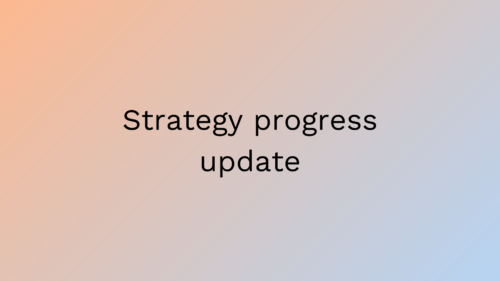How to thrive as a Software Tester – A comprehensive guide for beginner testers
07.08.2023
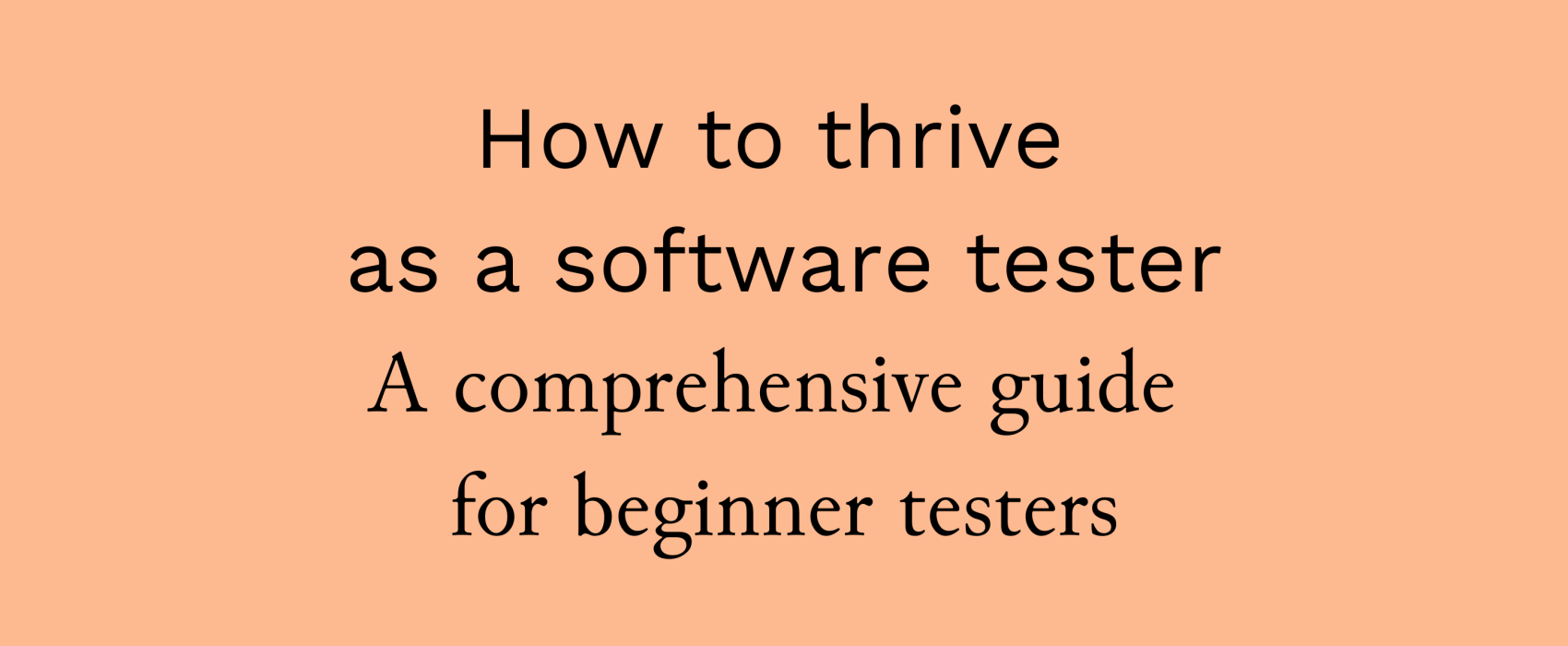
Software testing is sometimes overlooked in comparison with e.g. software development. However, testing and quality assurance are just as important as development, and really interesting too.
Would a career as a software testing professional be your thing? Are you ready to excel in this ever-evolving field?
This guide will provide you with the necessary guidance, recommendations and information you need to thrive as a beginner software tester.
Content
- Understanding the Role of a Software Tester
- Essential Skills for a Successful Software Tester
- What will be your field of expertise?
- Balancing Technical Expertise and Soft Skills
- How to communicate and collaborate effectively with development teams
- Pursuing Relevant Certifications
- Building a Professional Network in the Software Testing Industry
- Staying Updated with Emerging Technologies and Trends
- In what kind of company can you work in?
- Salaries in software testing roles
- Possible career paths in software testing
- Will AI take my job as a software tester?
1. Understanding the role of a software tester
A software tester plays a crucial role in the software development process by ensuring that the product meets its quality standards. They collaborate closely with developers and other stakeholders to identify defects, inconsistencies, and areas for improvement in the software.
This involves designing test cases, executing them, and reporting their findings. By doing so, software testers help to create a seamless user experience and mitigate risks associated with faulty software.
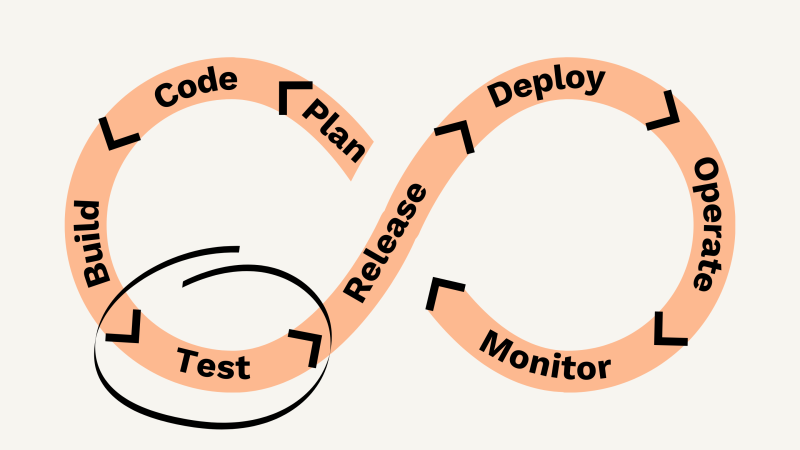
As a software tester, one must possess strong analytical, problem-solving, and communication skills to effectively detect and convey issues to the team.
2. Essential skills for a software tester
A successful software tester must possess a diverse skill set to excel in this role. However, worth noting is that naturally you don’t have to know much in the beginning, and you will never stop learning in your testing journey!
In general, test experts should have strong analytical and problem-solving abilities to identify defects and develop solutions. Naturally, communication skills are vital in this profession too as testers need to justify, persuade and understand various stakeholders.
For more technical testers, a solid grasp of programming languages like Java, Python, or C++ is crucial for understanding code structures and debugging errors. Familiarity with the most common software development methodologies, like Agile, Waterfall, or DevOps, is also essential.
Furthermore, software testers should be proficient in using testing tools like Selenium, Robot Framework, JIRA, or TestRail to automate and manage testing activities. Finally, certifications such as ISTQB, can showcase a tester’s commitment to quality and professionalism in the field.
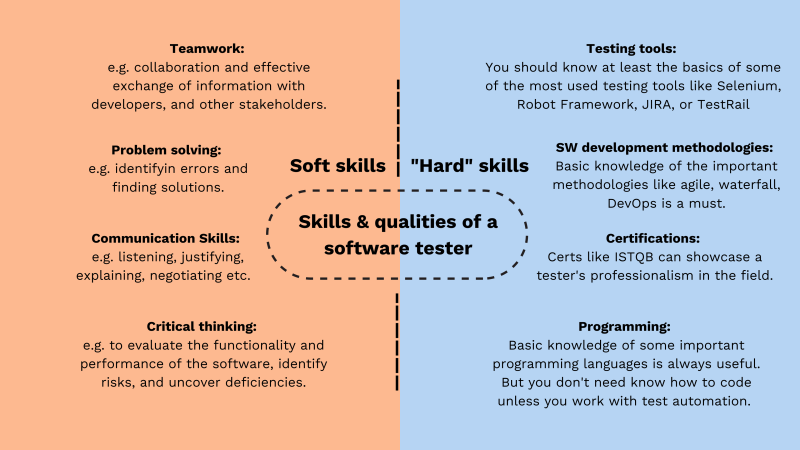
3. What will be your field of expertise?
There are many different aspects of testing and quality assurance that you can specialize in; like manual/exploratory testing, test management, test automation, performance testing, cyber security testing, accessibility testing and usability testing just to mention a few.
Then there are different levels of testing where you can work on, like development time (unit- and integration-), system- and acceptance testing levels.
Moreover, your role in the team might be for example in planning or leading the testing (and the team), automating the test cases, planning and creating the test cases or performing exploratory testing.
Some titles for a software testing professional can be e.g.: Software test engineer, Test automation engineer, Test manager & QA lead, just to name a few.
So, needless to say there’s a lot of opportunities. Luckily, choosing to focus on something rarely intervenes or harms doing something else in the future as all these parts, levels and aspects are more or less interconnected.
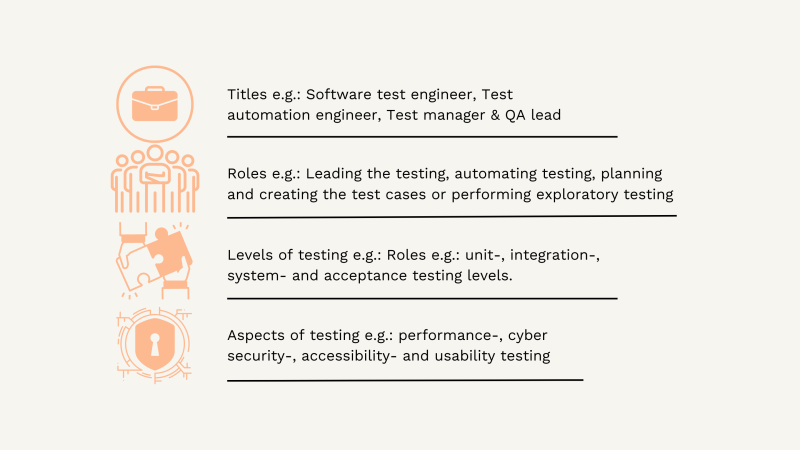
4. Balancing technical expertise and soft skills
In the world of software testing, a successful professional should possess a harmonious blend of technical expertise and soft skills. While it’s crucial to stay updated with the latest technological advancements and testing methodologies, it is equally important to develop strong communication and collaboration skills.
Effective software testers must be able to articulate their thoughts clearly, empathize with end-users, and work cohesively with cross-functional teams. By nurturing these soft skills, testers not only ensure the timely identification and resolution of software issues, but also contribute to a positive work environment that fosters innovation and teamwork.
Striking the perfect balance between technical acumen and interpersonal abilities can significantly increase one’s credibility and career growth potential in the software testing domain.
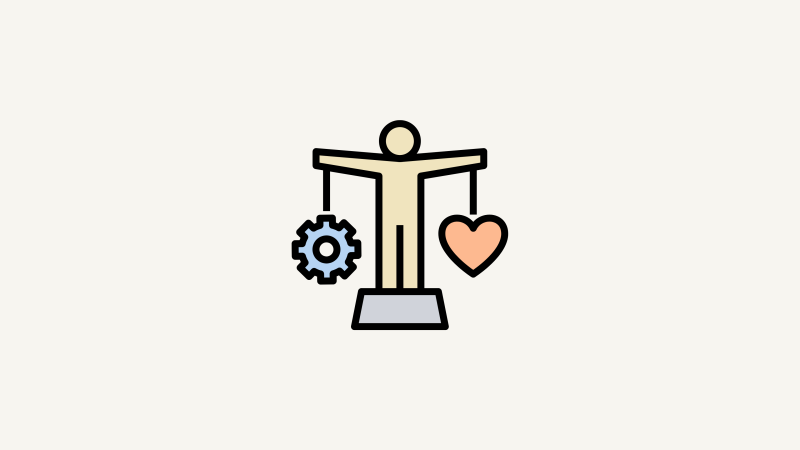
5. How to communicate and collaborate effectively with development teams
Once again we talk about communication as it really is one of the foundations of effective development and also of you being an effective team member.
One important aspect of communication is the communication between software testers and the development teams. Thus we gathered some practical tips on how to approach this topic and excel in it:
- Establish a collaborative mindset and recognize that all parties contribute to the overall success of the software project.
- Try to get aboard early in the development cycle: Participate in project planning, requirements gathering, and design discussions. Early involvement helps you gain a better understanding of the project and thus communicate.
- Use clear and concise communication: Clearly articulate the problem and provide detailed next steps.
- Participate in daily meetings: Testers should attend daily meetings with the development team to stay updated on project progress and discuss any testing-related blockers, challenges, or dependencies. This helps maintain a shared understanding of project status and enables quick resolution of issues.
- Provide understandable/repeatable bug reports: When you encounter bugs or issues, provide detailed and actionable bug reports to developers. Include steps to reproduce the issue, expected and actual results, relevant logs or error messages, and any other supporting information. This helps developers understand the problem and accelerates the debugging process.
- Collaborate on test case design: Involve developers in test case design to gain their insights and ensure test coverage aligns with the codebase. Developers can provide valuable input on edge cases, error handling, and other technical considerations that testers may overlook.
- Conduct regular bug triage meetings (e.g. defect board): Organize bug triage meetings where testers and developers come together to discuss and prioritize reported issues. Prioritization should consider factors like severity, impact on users, and dependencies.
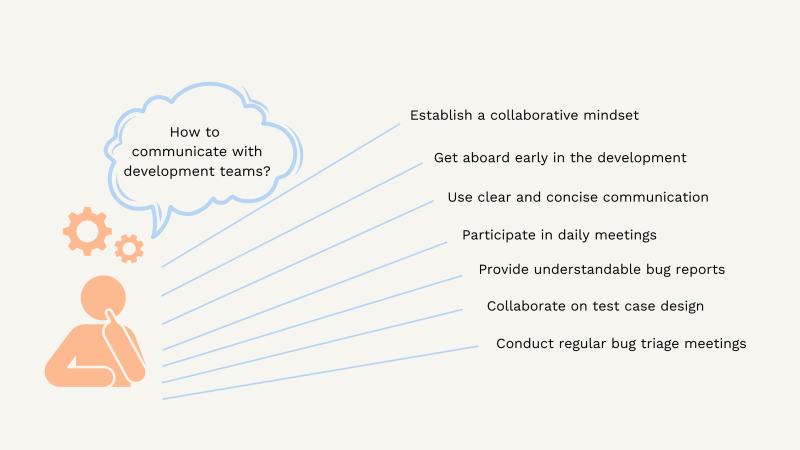
6. Relevant certifications for a software tester
To enhance your software testing career, pursuing relevant certifications and credentials is highly recommended. These certifications not only highlight your expertise and commitment to the field but also make you more attractive to potential employers.
ISTQB (International Software Testing Qualifications Board) certifications are a safe bet if you want to really learn things and gain prestigious certifications while doing it. The Foundation level certificate is good and worthwhile for all testing professionals, whereas the Advanced level Test manager training is good for Test managers (or aspiring ones) and the Test automation engineer certificate naturally for Test automation professionals.
Other good ones, specifically for Test managers, are for example Scrum master or product owner certificates and worth considering are also Prince2 / IPMA / PMP / Six Sigma certificates.
For test automation there are so many options that there really isn’t any bullet proof list or track you should follow. Instead, you should plan while you develop and think about what kind of tools, technologies, environments and platforms you should handle and then search for appropriate certificates.
By staying up-to-date with industry trends and acquiring pertinent certifications, you will position yourself as a valuable asset in the competitive software testing landscape, ultimately accelerating your career growth.
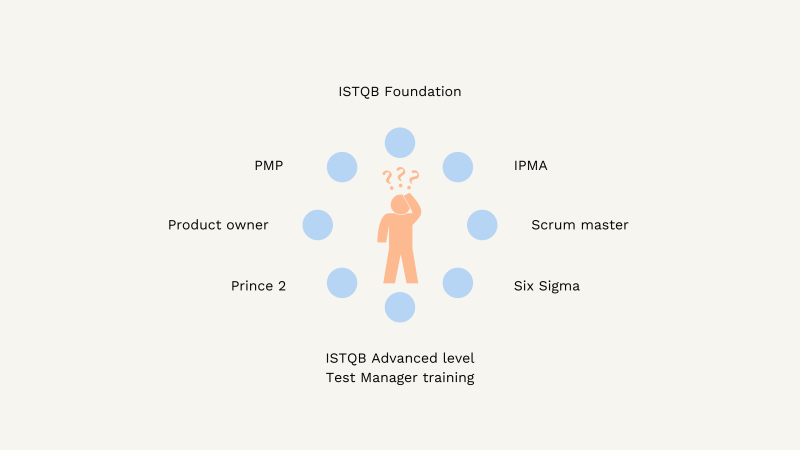
7. Building a professional network in the software testing industry
In the software testing industry, building a professional network plays an important role in expanding your knowledge, staying updated with the latest trends, and discovering new job opportunities.
To cultivate a robust network, you can start by attending industry events, conferences, and workshops to connect with like-minded professionals and thought leaders. Engage in discussions, share your insights, and learn from others’ experiences.
Then you can also join online forums and communities, such as LinkedIn groups, Meetup groups and software testing forums, to stay connected with your peers and build your networks.
Going further, you can consider collaborating on projects, contributing to open-source tools, or writing articles to showcase your expertise.
By consistently nurturing your relationships and actively participating in the software testing community, you can pave the way for a successful and fulfilling career.
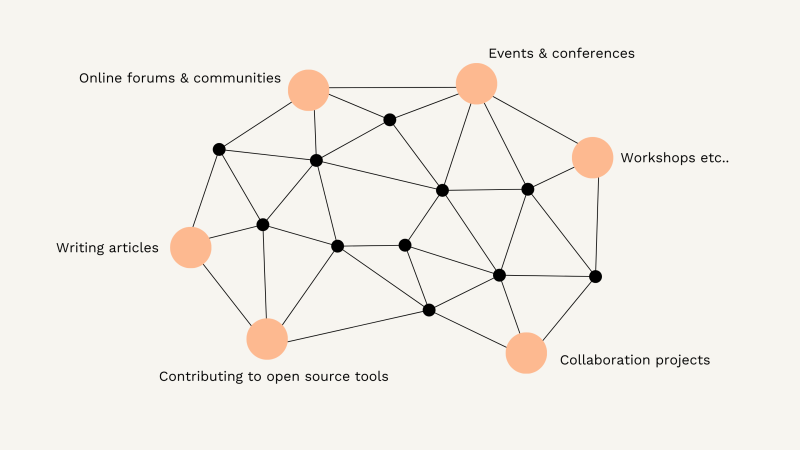
8. Staying updated with emerging software testing technologies and trends
Let’s face it, one of the best and toughest parts of working in IT is that if you don’t learn all the time, you get left behind.
Staying updated with emerging technologies and trends is paramount for software testers who wish to excel in their field. As the tech landscape evolves rapidly, testers must invest time in continuous learning and skills development to stay ahead of the curve.
This includes familiarizing oneself with new programming languages, automation techniques, and testing tools. Actively participating in webinars, conferences, and community forums, as well as reading industry magazines, news sites or blogs, can help one gain insights into the latest trends and best practices.
By proactively embracing change and adapting to new methodologies, software testers can not only enhance their career prospects but also contribute significantly to their organization’s growth and success.
9. In what kind of company can you work as a software tester?
Basically there is software development in almost all kinds of companies nowadays. And where there is development there is testing.
In this section, we’ll compare companies in which you work for the company itself versus the companies where you work for the clients of the company. The first we’ll refer to as a product company (because you usually work with a certain product or service) and the latter as a consulting company (because you usually work as a consultant for their clients).
Here you’ll find our guide/infographic thoroughly comparing the pros and cons of these two alternatives.
In general, working in a consultancy company brings a great deal of flexibility, variation and opportunities to learn and do what you want. Moreover, it’s a safer bet in terms of job continuity.
On the other hand, you can find better salaries in product companies and there are also lots of very stable jobs out there, the difference is in variation. Moreover, product companies might offer better longevity in terms of projects. Perhaps their greatest advantage however is the ability to create more communality and cohesion at the workplace.
10. Salaries in software testing roles?
VALA pays more or less average or a bit above average salaries in the industry in the capital region Finland. Here are some of our salary ranges (8/2023):
QA Engineer: 2600-4150 €/month
Test Automation Engineer: 2900-5350 €/month.
QA lead: 4150-5150 €/month.
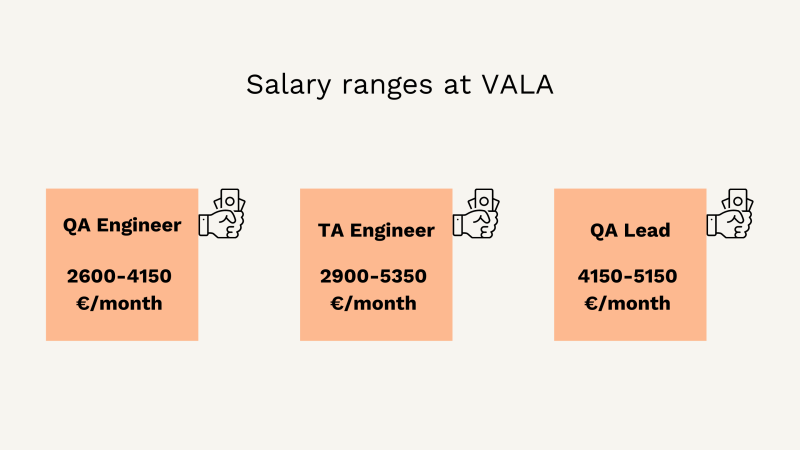
11. Possible career paths in software testing
There are many possible career paths in software testing. You can progress in basically any direction and also back and forth.
For example, you can start with exploratory testing, then develop your technical skills with test automation, and if you like, move into a more administrative role in test management. But that’s just one example and there really isn’t any correct way to go about your career in software testing and quality assurance.
We have a dedicated page for career paths in software quality which you can check here. Check it out to find a lot of inspiration and practical guidance related to various career paths in our field.
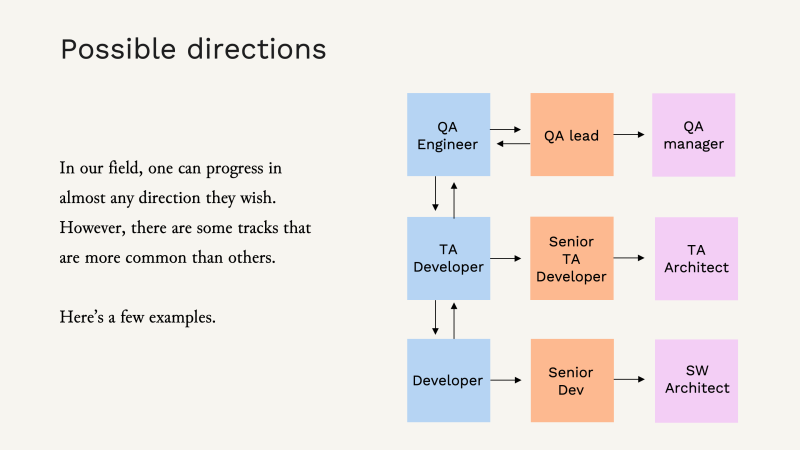
12. Will AI take my job in software testing
Especially people who are considering their career direction, must all consider the effect of artificial intelligence. How will it change the industry in question and will it at some point jeopardize my career?
Well, while AI can automate certain aspects of testing, it cannot entirely replace human testers. Testers bring critical thinking, domain knowledge, and a contextual understanding of the software to the table. They possess the ability to explore new and unforeseen scenarios, make subjective judgments, and provide valuable insights beyond what AI algorithms can offer.
Therefore, rather than replacing testers, AI is more likely to augment their roles, enabling them to focus on higher-value activities such as strategic test planning, risk assessment, test design, exploratory testing, and collaboration with development teams. Testers will need to adapt their skills and embrace AI as a valuable tool in their testing arsenal, ensuring that AI and human intelligence work together to deliver high-quality software.
Final words
There’s a lot of information in this guide. Lots of tips, tricks and links you can revisit when needed. But no one can remember it all after one read so please come back whenever needed.
Besides sharing valuable information, the other goal of this guide is to evoke aspiration towards software testing. After all, in our opinion, it’s the best thing you can do for a living ;). So, hopefully we succeeded in this and if we didn’t, please let us know how we could improve this guide!
All the best for your career and hopefully our paths will cross in the future!


